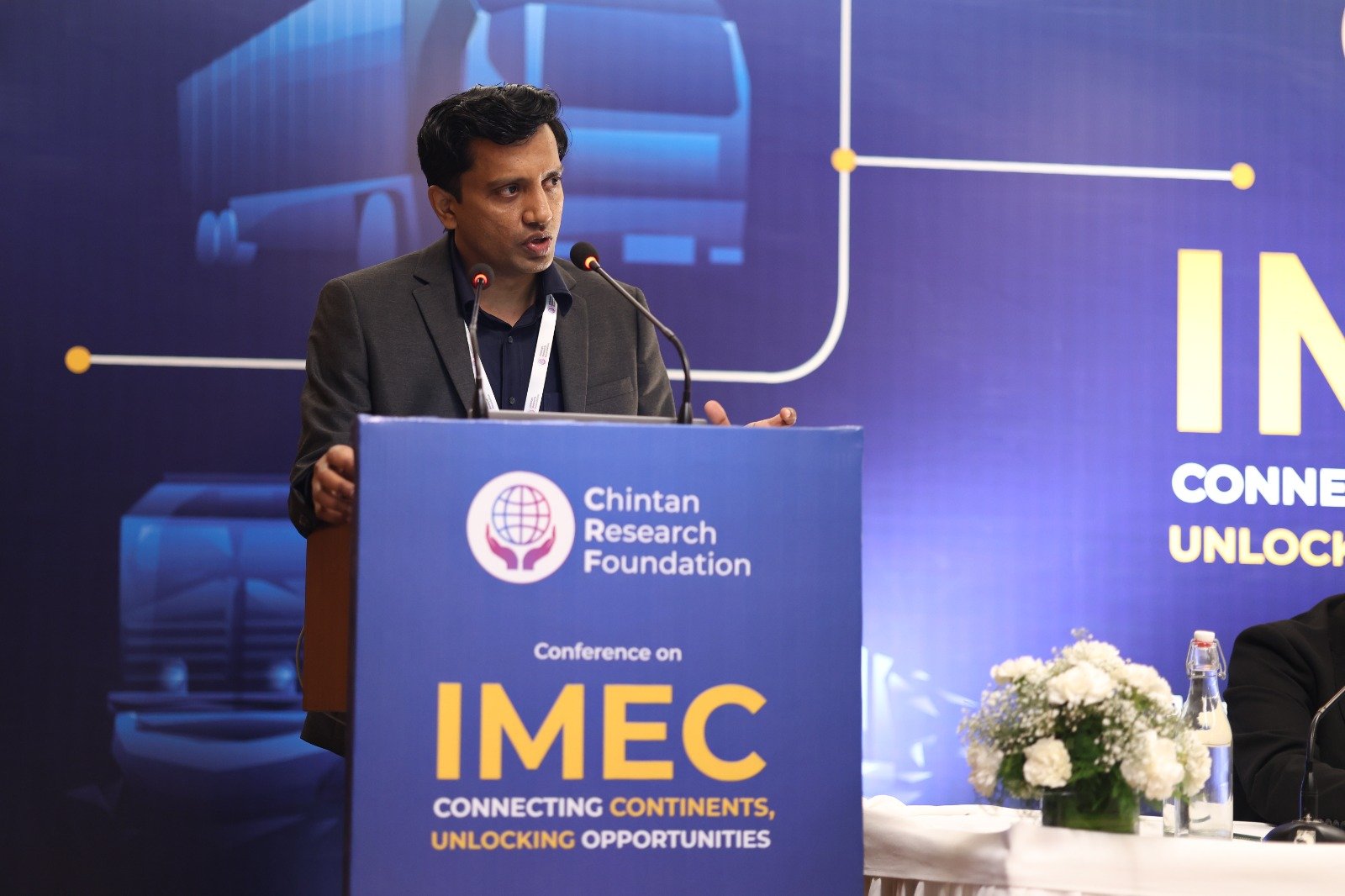
At the recent Chintan Research Foundation Conference on the India-Middle East-Europe Corridor (IMEC), Mr. Prasanna Karthik, Vice President of the Adani Group, gave a compelling and analytical view that cut through the geopolitical fanfare surrounding IMEC to present a more grounded perspective. While acknowledging the corridor’s bold vision, Mr. Karthik emphasised the need to assess the initiative through geopolitical, economic, and environmental lenses.
The Geopolitical Optics vs. Economic Realities
“There is no doubt that IMEC is being driven at a geopolitical level—it was, after all, unveiled during the G20 Summit in India. Yet, transportation corridors such as IMEC are fundamentally economic instruments. For IMEC to succeed, it must first and foremost make economic sense.”
He acknowledged the strategic collaboration between India, the United States, the European Union, and key Middle Eastern nations, but he cautioned that geopolitical enthusiasm must not overshadow economic pragmatism.
Logistics: A Reality Check
Mr. Karthik offered a data-driven look at the logistical challenges IMEC faces. He noted the ambitious plan for IMEC to be a multimodal corridor—combining sea, rail, and road—but warned of the inherent inefficiencies in such a system.
“A large container ship typically carries around 20,000 TEUs. A standard train can carry about 260 TEUs. That means it would take over 75–80 trains just to clear a single large container ship.”
He juxtaposed this with the UAE’s Etihad Rail, which operates 90 trains a week and moves only 1.1 million TEUs annually. In stark contrast, the Suez Canal handled 35 million TEUs in 2023. For IMEC to match that, rail capacity would have to grow at least 35 times.
The Cost of Complexity
Highlighting operational inefficiencies, Mr. Karthik noted the costs involved in repeatedly transferring cargo from ship to rail and back, especially when compared to the seamless port-to-port shipping through the Suez Canal.
He also flagged customs coordination across multiple jurisdictions as a major challenge. “While such harmonization is achievable in theory, in practice it demands sustained diplomatic effort and regulatory reforms.”
The Environmental Perspective
While rail transport is generally cleaner than road transport, Mr. Karthik clarified that large container ships remain more energy-efficient per unit. Thus, contrary to common perception, IMEC might not offer a significantly lower carbon footprint—“at least not yet.”
Speed vs. Scale
Mr. Karthik acknowledged that once operational, IMEC could reduce transit times by 15–20 days for certain cargo types. However, he warned against overestimating its scalability.
“Replicating this speed for bulk or large-scale shipments across the board is not feasible with current infrastructure.”
Drawing a parallel with the Iran-China overland corridor, he noted that while faster transit is possible for niche cargo, the bulk of trade still moves by sea due to cost and volume considerations.
A Strategic Complement, Not a Replacement
Rejecting the notion of IMEC as a substitute for the Suez Canal, Mr. Karthik proposed a more realistic framing: “IMEC should not be seen as a replacement for the Suez Canal, at least not in its current form. Rather, it should be developed as a strategic complement—a reliable and efficient route for specific types of cargo.”
He underscored the crucial role of public-private partnerships in unlocking IMEC’s true potential. “The private sector brings innovation, agility, and the capacity to reimagine existing paradigms.”
The Road Ahead: Realism Over Rhetoric
Mr. Karthik called for a new ecosystem to support IMEC—one that includes interoperable customs systems, cutting-edge logistics, and harmonized regulations, backed by strong political will.
“IMEC is a bold and visionary idea. But vision alone is not enough. For it to become a true game-changer, we must ground our excitement in realism and commit to incremental, strategic progress.”
He reminded the audience that the Suez Canal succeeded not because a global power willed it so, but because it met real, scalable market demand. The same logic, he argued, must guide IMEC’s evolution.
Leave a Reply